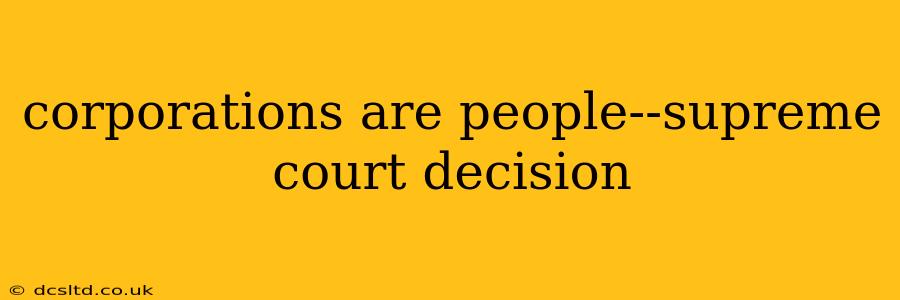The assertion that "corporations are people" is a highly debated topic, often simplified and misinterpreted. It's crucial to understand the nuances of the Supreme Court decisions that have shaped this ongoing conversation, focusing on the legal context, not a literal interpretation. This isn't about granting corporations the same rights as individual human beings; rather, it concerns specific legal protections and limitations granted under certain circumstances. This post will delve into the key decisions, explore common misconceptions, and examine the broader implications of this legal concept.
What Supreme Court Cases Established This Idea?
The phrase "corporations are people" is a shorthand for a more complex legal reality. No Supreme Court decision explicitly states "corporations are people" in a literal sense. Instead, several rulings have granted corporations certain rights traditionally associated with individuals under specific constitutional provisions. The most frequently cited cases are those dealing with the First Amendment's protection of free speech and the Fourteenth Amendment's guarantee of equal protection under the law.
-
Citizens United v. Federal Election Commission (2010): This landmark case significantly impacted campaign finance regulations. The Court ruled that corporations and unions have a First Amendment right to engage in political spending, contributing to the ongoing debate about the influence of money in politics. The decision did not grant corporations all the rights of individuals, but it did significantly expand their ability to participate in political discourse.
-
Santa Clara County v. Southern Pacific Railroad (1886): This case is often cited as the origin of the "corporations are people" concept. However, the historical context is crucial. The actual ruling was brief and ambiguous. While the headnote (a summary written by a court reporter, not the justices themselves) stated that corporations are persons within the meaning of the Fourteenth Amendment, the justices themselves didn't explicitly endorse this view in their opinion. The interpretation of this case remains a subject of scholarly debate.
It's vital to remember that these decisions haven't equated corporations with individuals in all aspects. Corporations do not have the same rights as individuals regarding due process, voting, or other fundamental rights. The Supreme Court has consistently distinguished between the rights of individuals and corporations.
Are Corporations People in the Same Way Humans Are?
No. This is a crucial point to clarify. The legal concept doesn't equate corporate personhood with human personhood. The Supreme Court has consistently held that corporations are not individuals in the sense of having the full range of rights and responsibilities granted to human beings. The legal concept of "corporate personhood" applies narrowly to specific legal contexts, primarily to protect certain rights associated with freedom of speech or association within the bounds of the law.
What Rights Do Corporations Have?
Corporations possess specific legal rights within the context of relevant laws and court rulings. These rights typically focus on:
- First Amendment rights (limited): This includes the right to engage in political speech (with some limitations as defined by subsequent case law) and freedom of association.
- Fourteenth Amendment rights (limited): This refers mainly to due process and equal protection in specific contexts, but not encompassing all aspects of these rights.
These rights are not absolute and are subject to reasonable regulations.
What Are the Criticisms of "Corporations Are People"?
The concept of corporate personhood has faced significant criticism. Critics argue that:
- It allows corporations undue influence in politics: This concern stems from cases like Citizens United, which critics say allows corporations to wield disproportionate political power.
- It undermines the democratic process: Critics argue that corporate lobbying and political spending distort the political landscape, favoring corporate interests over the interests of individuals.
- It lacks moral and ethical grounding: Critics contend that it's illogical to equate profit-driven entities with human beings possessing inherent rights and moral responsibilities.
How Does This Affect Everyday Life?
The implications of corporate personhood are far-reaching and affect various aspects of daily life, including:
- Campaign finance: The influence of corporate money in politics is a major consequence.
- Regulation: The interpretation of corporate personhood shapes how corporations are regulated.
- Social responsibility: The debate about corporate social responsibility is directly related to the discussions surrounding corporate personhood.
Understanding the nuances of corporate personhood is crucial for participating in informed discussions about law, politics, and the role of corporations in society. It's not a simple matter of literal interpretation, but rather a complex legal concept with profound implications.
